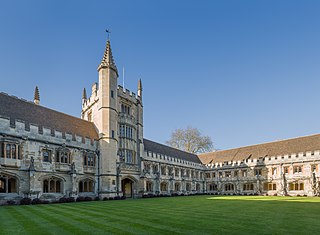
Magdalen College is a constituent college of the University of Oxford. It was founded in 1458 by William of Waynflete. Today, it is the fourth wealthiest college, with a financial endowment of £332.1 million as of 2019 and one of the strongest academically, setting the record for the highest Norrington Score in 2010 and topping the table twice since then. It is home to several of the university's distinguished chairs, including the Agnelli-Serena Professorship, the Sherardian Professorship, and the four Waynflete Professorships.

Hertford College is a constituent college of the University of Oxford in England. It is located on Catte Street in the centre of Oxford, directly opposite the main gate to the Bodleian Library. The college is known for its iconic bridge, the Bridge of Sighs. There are around 600 students at the college at any one time, comprising undergraduates, graduates and visiting students from overseas.
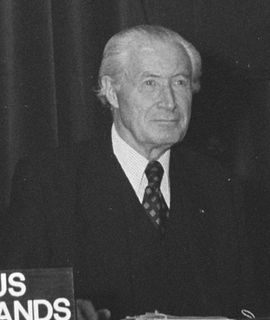
Edwin Duncan Sandys, Baron Duncan-Sandys, was a British politician and minister in successive Conservative governments in the 1950s and 1960s. He was a son-in-law of Winston Churchill.

Magdalene asylums, also known as Magdalene laundries, were initially Protestant but later mostly Roman Catholic institutions that operated from the 18th to the late 20th centuries, ostensibly to house "fallen women". The term implied female sexual promiscuity or work in prostitution, young women who became pregnant outside of marriage, or young girls and teenagers who did not have familial support. They were required to work without pay apart from meagre food provisions, while the institutions operated large commercial laundries, serving customers outside their bases.

George Hickes was an English divine and scholar.

George Clarke, of All Souls, Oxford, was an English architect, print collector and Tory politician who sat in the English and British House of Commons between 1702 and 1736.
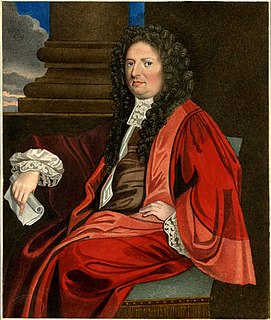
Robert Plot was an English naturalist, first Professor of Chemistry at the University of Oxford, and the first keeper of the Ashmolean Museum.
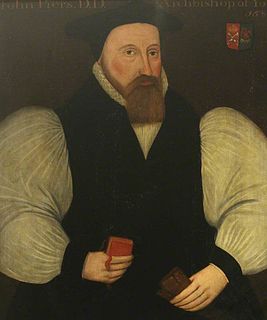
John Piers (Peirse) was Archbishop of York between 1589 and 1594. Previous to that he had been Bishop of Rochester and Bishop of Salisbury.
Events from the year 1767 in Ireland.
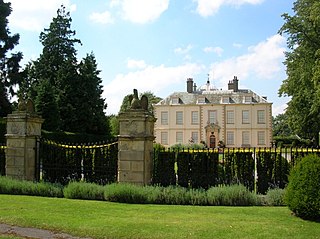
Sir John Stapylton, 3rd Baronet, of Myton in Yorkshire, was an English landowner and Tory politician who sat in the House of Commons from 1705 to 1708.
Richard Mayew (1439/40–1516), also written Mayo, was an English academic, who became Bishop of Hereford and a diplomat for Henry VII of England.

Sir Herbert Croft, 1st Baronet was a British politician.

St Mary Magdalen Bermondsey is an Anglican church dedicated to St Mary Magdalen in Bermondsey in the London Borough of Southwark. The present building is late 17th century and is Grade II* listed.
Henry Holyoake (1657–1731) was a headmaster of Rugby School for more than forty years in the 17th and 18th centuries.
Godfrey Clarke, was an English landowner and politician who sat in the House of Commons from 1710 to 1734.

Sir William Baker was an English merchant and politician, a Member of the Parliament of Great Britain and Governor of the Hudson's Bay Company.

Henry Savage was an English clergyman, academic and controversialist, Master of Balliol College, Oxford from 1651.
Sir Thomas Culpeper, 3rd Baronet, also known as Colepeper, of Preston Hall, Aylesford, Kent was an English landowner and Whig politician who sat in the English and British House of Commons between 1705 and 1723.
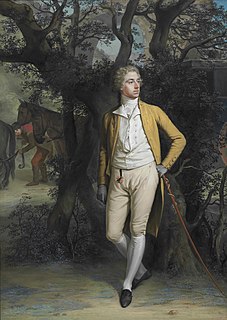
Arthur Hill, 2nd Marquess of Downshire PC, FRS, styled Viscount Fairford until 1789 and Earl of Hillsborough from 1789 to 1793, was a British peer and MP.

Samuel Carte was an English antiquarian and clergyman of the Church of England. After attending Magdalen College, Oxford, he held many ecclesiastical positions in his adult life, publishing two sermons. He was an active local antiquarian researcher, assisting several fellow antiquarians in their histories of Leicestershire, and publishing several articles and one book on such subjects.














